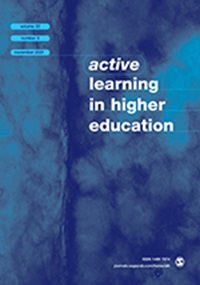团队合作:在线认知社会学习参与的类型学
IF 3.8
1区 教育学
Q1 EDUCATION & EDUCATIONAL RESEARCH
引用次数: 8
摘要
在高等教育中,学生和机构越来越多地转向混合组件和完全在线学习课程。在线教学的最佳实践被理解为以学生为中心,强调通过协作进行社会学习。社交方面支持参与频率,而协作活动支持认知参与。指导在线教学的研究主要来自于确定学生认知参与类型和频率的研究,通常是连续的,但没有社会学习的细微差别。为了在此基础上确定认知社会参与的概况,本研究在一个基于聊天平台的课程中检查了3855名学生的帖子内容。研究结果表明,学生的参与有六种类型:潜伏、肤浅、任务、回应、拓展、创造。然后,这些类型被进一步研究的复杂性和强度的参与两个连续体。研究结果提出了一种新的认知社会学习参与类型,由四种类型定义:坐板凳者、骗子、前锋和冠军。这种类型学是故意使用团队游戏的首字母缩略词来构建一种可用的语言,供教育工作者识别学生的参与概况,并指导在线社交空间的学习设计。本文章由计算机程序翻译,如有差异,请以英文原文为准。
Play like a team in teams: A typology of online cognitive-social learning engagement
Within higher education, students and institutions are increasingly moving towards blended components and fully online learning coursework. Best practice online pedagogy is understood to be student-centred with a strong emphasis on social learning through collaboration. The social aspect supports frequency of engagement while collaborative activity supports cognitive engagement. Research that guides online pedagogy draws substantially from studies identifying type and frequency of students’ cognitive engagement, usually along a continuum but without the nuance of social learning. To build on that and to identify profiles of cognitive-social engagement, this study examined the content of 3,855 student posts from one course within a chat-based platform. The findings suggested six student engagement types: lurk, superficial, task, respond, expand, create. These types were then further examined along two continuums of complexity and intensity of engagement. The results present a new typology of cognitive-social learning engagement defined by four profiles: bench sitter, hustler, striker, champion. The typology was purposely fashioned using team-play acronyms to build a useable language for educators to recognise student engagement profiles and to guide learning design in social spaces online.
求助全文
通过发布文献求助,成功后即可免费获取论文全文。
去求助
来源期刊

Active Learning in Higher Education
EDUCATION & EDUCATIONAL RESEARCH-
CiteScore
13.20
自引率
12.00%
发文量
31
期刊介绍:
Active Learning in Higher Education is an international, refereed publication for all those who teach and support learning in higher education (HE) and those who undertake or use research into effective learning, teaching and assessment in universities and colleges. The journal is devoted to publishing accounts of research covering all aspects of learning and teaching concerning adults in higher education. Non-discipline specific and non-context/country specific in nature, it comprises accounts of research across all areas of the curriculum; accounts which are relevant to faculty and others involved in learning and teaching in all disciplines, in all countries.
 求助内容:
求助内容: 应助结果提醒方式:
应助结果提醒方式:


